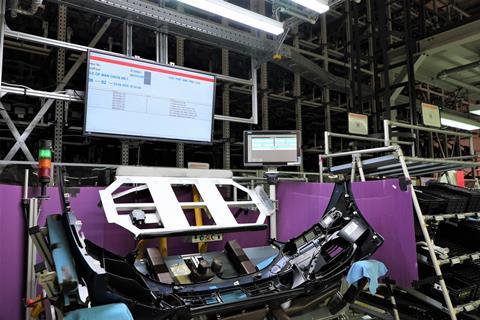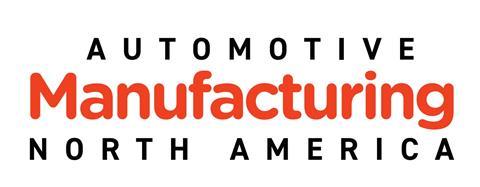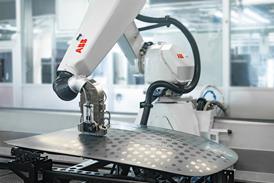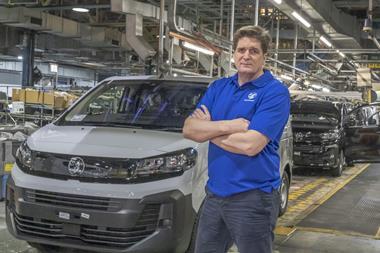BMW layers lean manufacturing principles with the application of digital technologies to develop standardised, human-centric production processes.
At the heart of BMW’s iFactory initiative lies the Shop Floor Digital transformation programme – an ambitious, cloud-based overhaul of production processes. According to Franz Heigl, Head of Digitalisation for Component Manufacturing, the programme centres on three goals: “production quality, production control, and production monitoring,” all designed with the user in focus.

Digital tools supporting standardisation
BMW’s approach blends cutting-edge digital systems with lean manufacturing principles. As Heigl puts it, “Lean before digital – that is always important.” The transformation starts with harmonising processes across diverse manufacturing domains before layering in digital tools, ensuring consistency and adaptability. For example, Landshut – BMW’s largest component plant – produced over 5m components last year using varied processes. Despite this diversity, BMW aims to implement a standardised process that works for component manufacturing, notes Heigl.
One major milestone at Landshut is the implementation of BMW’s proprietary Energy Master, the central control unit for the high-voltage battery fitted to the Neue Klasse vehicles. This production process features inline monitoring, utilising AI-based camera systems and component systems testing for 100% of the units produced, in a cleanroom environment. The Landshut plant will supply the Energy Master globally to all battery assembly plants, to be mounted on the high-voltage battery in a final assembly step.
Heigl observes that this showcases the adaptability of the digital infrastructure across different product lines.
Read more on BMW’s digital transformation:
- Future-ready: BMW’s digital transformation of its Munich plant and beyond
- BMW’s vision for a digitally transformed logistics and production network
BMW’s digital transformation also empowers people. Heigl emphasises that this programme only works in conjunction with the people in the factory, highlighting employee engagement as central to its success. Through initiatives like the AI Lab and training programs for suppliers (e.g., the Zero Defect Supply Chain Campus), BMW ensures that staff are equipped to handle new technologies, fostering what Heigl calls “reaction and analysis skills.”
Digital tools like the internally developed AIconic Search and AIQX (an AI-based visual inspection platform) are key enablers. “AIconic – it’s like our ChatGPT inside BMW,” Heigl explains. Unlike open systems, BMW’s platform uses only curated, expert-reviewed data, ensuring high-quality output and scalable insights. AIQX, meanwhile, allows rapid deployment of visual quality checks with simple cameras and cloud integration, now used in over a thousand applications at Landshut.
Real-time transparency and supply chain integration are also priorities for BMW, which involves harmonising data from almost 2,700 suppliers worldwide. Challenges remain, especially with varied IT systems, but BMW is tackling them through process alignment and collaborative development.
The ROI of these efforts is clear. Heigl notes, “Digitalisation must be cost effective.” BMW’s in-house systems, like the Smart Transport Robot and AIQX, exemplify this principle, delivering value through speed, scalability, and integration.
Ultimately, the Shop Floor Digital Transformation isn’t just about technology – it’s about building a resilient, efficient, and future-ready production model. Heigl notes that in BMW’s vision, complexity becomes opportunity – and digitalisation, a strategic imperative.
“Suppliers are using different systems. You have to connect the data, and that is the challenge” – Franz Heigl, BMW
Supply chain transparency
As BMW continues to scale up its digital transformation across production, achieving full supply chain transparency remains a challenge.
A major complication lies in the sheer scope of the supply network. “We have about 2,700, suppliers all over the world. And those suppliers also have other suppliers,” Heigl notes. This cascading network of partners introduces variability in data quality, formats, and IT systems, all of which must be reconciled to maintain visibility across operations.
Although BMW has robust systems in place for internal transparency – from goods inbound to end-of-line checks – external suppliers often operate on disparate platforms. To address this, BMW has initiated structured programmes to raise standards and improve communication with its suppliers.
One such initiative is the above mentioned “Zero Defect Supply Chain Campus.” As Heigl explains, “It’s a process where you bring the supplier to our plant, provide training and show them how important it is to have all the data.” The goal is to align partners with BMW’s own standards for quality and transparency.
One of the tools enabling this transformation is the internally developed AI platform, AIconic Search. Originally rolled out for the purchasing and supplier network division, the system acts like a proprietary version of ChatGPT, optimised for quality-assured internal data. With more than 1,000 users conducting 10,000+ searches, it’s already proving valuable in managing supplier-related insights and data retrieval.
Despite these advancements, system incompatibility remains a stubborn issue. “Suppliers are using different systems,” explains Heigl. “You have to connect the data, and that is the challenge.”
Another tactic BMW uses is progressive disclosure of planning data. Rather than overwhelming suppliers upfront, the company provides increasingly detailed forecasts as production dates near. “Maybe five months before [production], you get more information and clearer information,” says Heigl, outlining how this helps streamline logistics without flooding the supply base prematurely.
Heigl adds that transparency itself isn’t optional. “If you don’t have the data in the cloud. You can’t use AI accurately. And without that, you’re out.”
“We set up showcases on AI that are already used in the plant, so employees can get an understanding of what it looks like, how it works… and get a bit more of a connection to the topic” – Franz Heigl, BMW

Custom tools, smarter processes, empowered people
The Shop Floor Digital programme is user-centric in its design. A standout feature of BMW’s approach is its internal development of AI tools tailored to manufacturing needs. The AIconic Search, AI assistant, enables staff to conduct deep data searches across technical documentation, supplier reports, and quality databases, significantly speeding up problem-solving and knowledge access.
AI isn’t just about search – it’s embedded in visual inspection too. The OEM’s proprietary AIQX system leverages AI to inspect components in real time using simple camera setups and cloud-based processing. Heigl says, “We are currently scaling it across our component production, checking each value stream.” Over 1,000 AIQX units are already deployed across Landshut.
What makes BMW’s integration strategy distinct is its blend of standardisation and adaptability. Every process begins with lean principles “Lean before digital,” as Heigl stresses. Only once processes are simplified and harmonised does digitalisation follow. If specialised needs arise, solutions are modularised, like an app.
The AI tools are also being democratised across the workforce. BMW recently launched the AI Lab – a space where employees interact with new technologies and applications firsthand. “We set up showcases on AI that are already used in the plant,” says Heigl. “So employees can get an understanding of what it looks like, how it works… and get a bit more of a connection to the topic.”
Interestingly, BMW is shifting from being a tech adopter to a tech creator. As Heigl notes the digital tools work because “we have our own data, our own opportunity to scale it very fast.”

Join the conversation on the digital transformation
Discover how leading OEMs and suppliers are implementing smarter digital tools into serial production across North American manufacturing at Automotive Manufacturing North America, 22-23 October in Detroit.
Learn from experts driving smarter, safer and more agile production – and see the technologies transforming the factory floor.
Register now to secure your place at Automotive Manufacturing North America
Futureproofing manufacturing
BMW is reengineering how cars are built with its forward-looking manufacturing and digitalisation strategy. One of the company’s major principles is adaptability. As Heigl explained, BMW’s component plants handle “more than 5 million components each year” across diverse domains, from light metal casting to electric motor housings. Despite this variety, BMW insists on common end goals – especially around quality checks.
The OEM sees complexity not as a barrier but as a strategic opportunity, developing its production teams and technologies in the transformation process. This belief drives initiatives such as the AI Lab support the ‘democratisation’ of digital tools.
Ultimately, Heigl frames digitalisation as both a necessity and an investment. With its layered strategy of standardisation, in-house innovation, and workforce empowerment, BMW is building a digital manufacturing ecosystem designed not just to survive the future – but to shape it.











































No comments yet